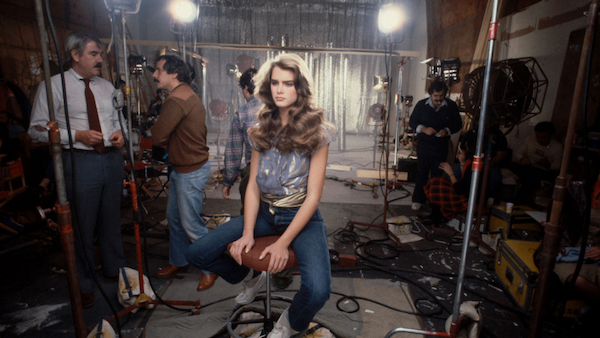Movie review by Greg Carlson
Filmmaker Lana Wilson’s “Pretty Baby: Brooke Shields” uses two parts (now on Hulu following a world premiere at the Sundance Film Festival) to explore the career of its title subject, the well-known model, actor, performer and celebrity. Life in the spotlight began for Shields when her mother Teri supposedly announced – just five days after her daughter was born – that she intended to guide the child into show business. True to her word, Teri soon booked an Ivory Soap gig when Brooke was eleven months old. Wilson, who previously directed “After Tiller,” “The Departure,” and “Miss Americana,” continues to show a keen critical interest in mental health, society, and gender, but this latest project might be the least successful of the set.
In contrast to Davis Guggenheim’s outstanding “Still,” in which virtually all of the onscreen and offscreen talking is done by Michael J. Fox, Wilson opts for the more typical approach in which a sizable number of friends, associates, and cultural commentators lend their voices to sound bites large and small. As a result, the noise often obscures, rather than illuminates, the “meaning” of Shields in her various guises, iterations, and public personae. Not surprisingly, Shields blows each and every one of the other talking heads out of the water; she’s easily and confidently her own best interpreter and authority.
Additionally, Wilson’s decision to arrange the events in roughly chronological order means that the most intense and fascinating content unfolds during the first episode. By the time we have caught up to the mature Shields as she deals with feelings of guilt and frustration accompanying postpartum depression (over which Tom Cruise publicly made an utter ass of himself), the individual segments have become wobbly and out of balance. As Susie Bright describes it, the vibe “plays out like a VH1 ‘Behind the Music’ episode” and “By not meeting the moment, the biopic deadends in ennui.” The movie’s lack of candor in several areas is most likely the result of demands made by Shields to secure her participation, even though Wilson has claimed that nothing was off limits.
In the introduction of his March 2023 Shields interview in “The New Yorker,” Michael Schulman identifies what I think is the turning point in the public perception of the star. The release of the ghostwritten college advice book “On Your Own,” “revealed that [Shields] was a virgin, a fact that transformed her from a symbol of libertinism into one of Reagan-era chastity.” Setting aside the creepy, obsessive nonsense surrounding the very concept of “purity,” which looks an awful lot like another mechanism used by men to control women, none of the participants nor Wilson adequately account for the shift. Instead, there is an oddly distancing rundown of relationships with Michael Jackson, Dean Cain, and Andre Agassi.
Wilson goes to great lengths to acknowledge – if not completely reckon with – the spectacle of sexualization Shields experienced as a child and a minor. For her part, Shields maintains to this day the same steadfast refusal to accept any shame or regret for “Pretty Baby,” “The Blue Lagoon,” “Endless Love,” and the controversial Calvin Klein spots. Her on-camera poise, evident from childhood and demonstrated in multiple talk show clips of older men commenting on her physical appearance, communicates an astute awareness of the unusual circumstances of her entire life. Brooke Shields has never known a time without fame and the punishments and privileges that go with it.
